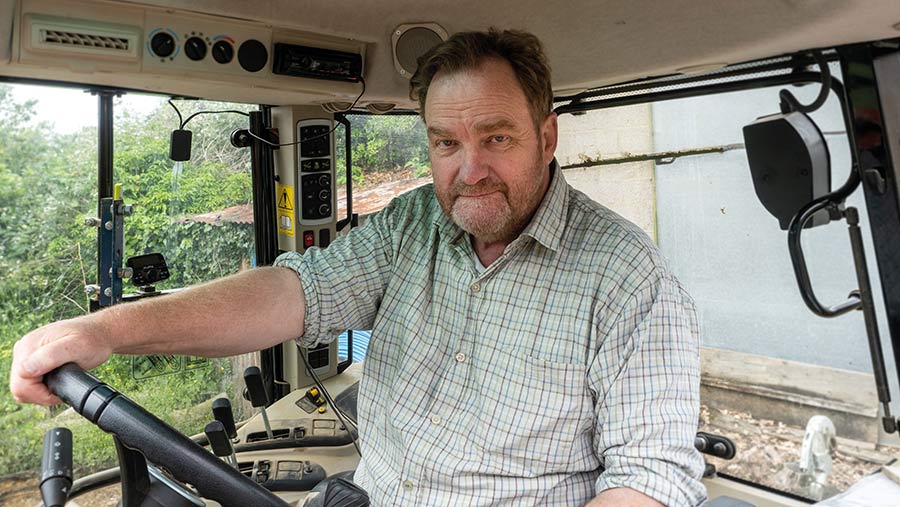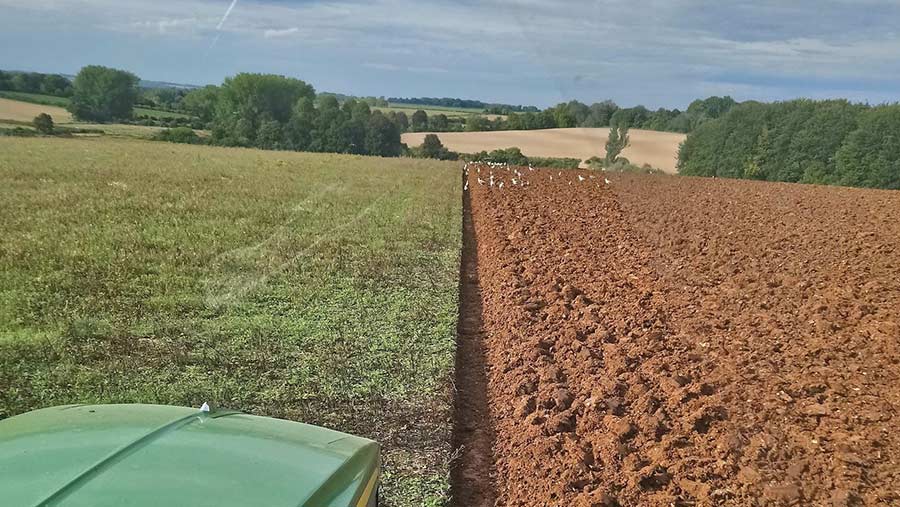Flindt on Friday: The debate over ploughing is getting dirty
 © Kathy Horniblow
© Kathy Horniblow While the Deere’s turbo cooled for my tea break, I gave the plough skims a bit of a scrape off.
The National Trust have called me in to help with some autumn grass establishment, and that meant getting the old rusty Kverneland out of the bushes.
An hour or two with some Norton Blaze pads on the angle grinder and then 40 acres of tough and dirty stubble meant the No 28s were shining, but the skims were still annoyingly dull. And the knotgrass was being as stubborn as ever to go through.
See also: Business Clinic: Should I plough grass for cereals?
At last, I could shut down and enjoy my Thermos with a fine view from the top of Kilmeston Road field, north over the source of the Itchen and on past New Cheriton village.
(Or Hinton Marsh, as it used to be called, before estate agents discovered why people weren’t buying houses there.)

© Charlie Flindt
All my tea breaks at the moment feel significant and sombre, but this one was more so than the others. For a start, I’m being employed – and that does feel odd.
And I’m spending my last arable days using the most iconic of farm tools – the plough. I’m not doing too bad a job of it, if I say so myself.
Furrow furore
But in the past few years the plough has become more than just an icon of farming; it has become the unhappy centre of the culture war that is spreading from society in general and is now enveloping British agriculture.
There’s a schism developing, with the two sides (let’s use “New Wave” and “Traditionalists” as labels) unable to agree on some of the very basics of farming.
Choose almost any topic, and the two sides will come to cyberblows.
Nutrients? NW: Livestock make ’em. Trad: Always replace what you take away. Soil? NW: Being washed away. Trad: All still here.
Heroes? NW: Gabe Brown and Greta. Trad: Fritz Haber and pre-eco Clarkson. Carbon dioxide? NW: Gaseous embodiment of pure evil. Trad: Plant food. Daily mission? NW: Get “regen” in Twitter bio. Trad: Feed people.
Favourite motto? NW: “Human” comes from “humus”. Trad (when they’ve stopped laughing at the “humus” line): Two blades of grass where once there was one.
And then, of course, there’s the humble plough. We all know what the New Wave farmers think of the plough, thanks to the steady stream of Malthusian nonsense churned out by the NW cheerleaders, usually plugging their latest book: Why Ploughmen are All B*stards.
You can hardly open a weekend paper without a breathless full-page article telling its furrow-browed readers how evil the mouldboard is.
Time team
What do we Traditionalist farmers think of the plough? Best job ever. Chemical-free weedkiller (hence its choice by the National Trust). Soil conditioner. Counteracts soil erosion.
It makes topsoil by incorporating organic residue. And it provides a deep emotional link to the countless generations who have done the same job on the same land.
And if it has been going on for 5,500 years, you’d think its supposed catastrophic effect would be obvious by now.
My tea break had gone on for quite long enough, and it doesn’t do to dwell on such matters. The agri-culture war can be soul-destroying. And I’d hate to be caught idling by someone in a Trust-liveried pick-up.
I fired up the Deere and set off back down the hill. Over in the Hangar field I could just make out a darker patch of soil in the chalky brow which a tenant had strip-farmed in 1616 – he’s on the famous Thomas Langdon map of Kilmeston parish.
I wonder if his plough had problems with knotweed?

